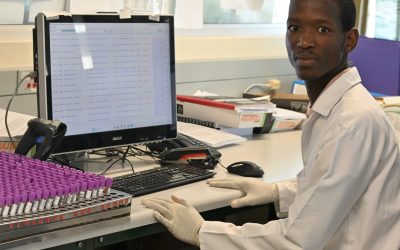At Sefako Makgatho Health Sciences University (SMU), a quiet revolution is unfolding—one that is shaping future female leaders, entrepreneurs, and changemakers. The Student Women Economic Empowerment Programme (SWEEP) is more than a student society; it is a force redefining what it means to be a woman in higher education, proving that empowerment extends far beyond the lecture hall.
 SMU has long been recognised as a leading institution in health sciences, but SWEEP is ensuring that its impact reaches further, creating an enabling environment where female students gain not only academic knowledge but also the confidence, financial independence, and leadership skills to excel in the real world.
SMU has long been recognised as a leading institution in health sciences, but SWEEP is ensuring that its impact reaches further, creating an enabling environment where female students gain not only academic knowledge but also the confidence, financial independence, and leadership skills to excel in the real world.
“Our goal is to provide a platform for women to not only succeed at university but also thrive in the outside world,” says Noluthando Nsele, Chairperson of SWEEP. “We ensure that our members gain practical insights into business, leadership, and personal growth that will set them apart in their careers.” From hosting high-impact leadership development workshops to running mentorship programmes and networking opportunities, SWEEP is actively closing the gender gap in business and leadership. Its initiatives are designed to ensure that women graduate not just with a degree, but with the ability to navigate corporate boardrooms, launch successful businesses, and advocate for change in their communities.
Building women of substance
SWEEP’s approach is holistic, addressing key challenges that women face both on and off campus. The society runs intensive training on financial literacy and entrepreneurship, equipping students with the skills to start and sustain businesses. Leadership and confidence-building initiatives ensure that women take charge of projects, develop critical decision-making abilities, and prepare for executive roles.
Beyond professional development, SWEEP acknowledges the importance of mental wellness and work-life balance, offering structured support for students juggling academic, personal, and professional responsibilities. Through self-care events, mental health discussions, and social impact projects, the society fosters a well-rounded sense of empowerment. “Through team-building events, panel discussions, and pitching competitions, SWEEP fosters community engagement and growth,” says Nsele. “We also focus on raising awareness about critical issues such as gender-based violence (GBV) and mental health, which are integral to women’s empowerment.”
One of SWEEP’s most powerful aspects is its ability to create real-world change. A recent success story saw a SWEEP member turn a small idea into a thriving bakery business, employing fellow students and demonstrating the tangible impact of the programme.
 Despite its successes, SWEEP faces significant challenges. Engagement and participation remain hurdles, with the society working to attract more students and make its activities widely accessible. Funding is another critical issue—while SWEEP has achieved remarkable feats through fundraising, the need for financial support continues to grow.
Despite its successes, SWEEP faces significant challenges. Engagement and participation remain hurdles, with the society working to attract more students and make its activities widely accessible. Funding is another critical issue—while SWEEP has achieved remarkable feats through fundraising, the need for financial support continues to grow.
“The first challenge is engagement and participation—we believe more women should get involved, but we need to find innovative ways to market the programme effectively,” Nsele explains. “The second challenge is funding. Despite our efforts, we still lack sufficient resources to execute all our planned events and programmes. We are actively seeking sponsors and additional funding sources to expand our impact.”
In response, SWEEP is intensifying its marketing efforts, leveraging digital platforms, and forging new partnerships with organisations such as Entrepreneurship Development in Higher Education (EDHE), the British Council, and Universities South Africa (USAf). These collaborations expand students’ professional networks and create additional opportunities for funding and support.
Looking ahead, the society plans to expand outreach in 2025, reaching students across different faculties, increasing female leadership participation, and supporting the creation of more student-led businesses. Social initiatives such as pad drives and GBV awareness campaigns will remain central to SWEEP’s mission.
Beyond university: A lifetime of impact
SWEEP is not just about student life—it is a movement that prepares young women for life beyond university. By ensuring that SMU graduates leave with business acumen, leadership skills, and financial independence, SWEEP is actively shaping a new generation of female trailblazers.
More than just a student society, SWEEP is a launchpad for women ready to challenge norms, redefine success, and create lasting change. Through resilience, strategy, and relentless determination, the women of SWEEP are proving that at SMU, empowerment is not just a concept—it is a lived reality.
By Musa Msibi



